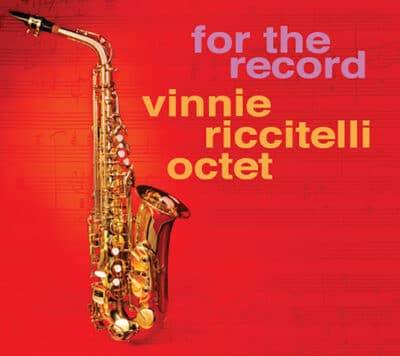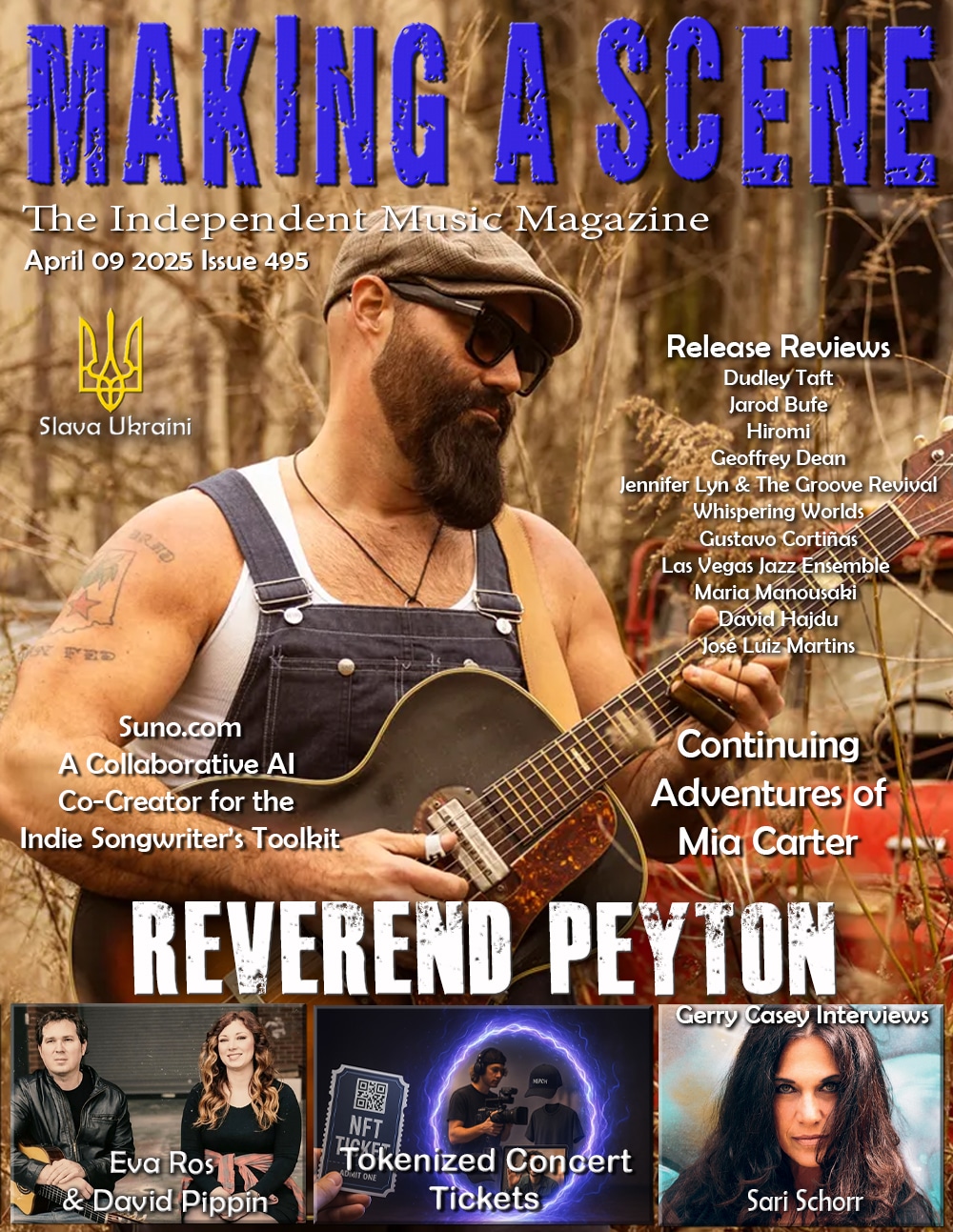Vinnie Riccitelli Octet For the Record
 Vinnie Riccitelli Octet
Vinnie Riccitelli Octet
For the Record
Self-released
The music is one thing. And then there’s the story. Sometimes there are both and such is the case with Vinnie Riccitelli as we are looking at likely the longest gap between recording projects in history – 65 years to be exact. Yes, you read that correctly; Riccitelli has only released one other album in his career, in 1956. The 94-year-young composer/altoist now retired has at least one more musical statement to make. Born in Yonkers, New York, Riccitelli began playing professionally at age 15, performing for vacationing New Yorkers in the Catskills during the summer. Think about that, a minor working in venues that served alcohol, something that would not happen today. At the age of 18 he enlisted in the Navy amid WW II and after service was accepted to Julliard as one of the first alto saxophonists ever to be accepted by the school. It was in 1956, just married to his wife of 60 years, Jean Krupa, when he wrote, arranged and recorded that first album, Unique Jazz, The Westchester Workshop, eight works played by his octet.
Several of the musicians on that date enjoyed rewarding careers and somehow Riccitelli got so busy as a sideman that he never returned to the studio until now. Consider this – four presidential inaugural balls, 15 years as a member of Bobby Rosengarden’s east coast Jerry Lewis telethon orchestra, and sideman gigs for Frank Sinatra, Tony Bennett, Barbara Streisand, Tom Jones, Engelbert Humperdinck, Liberace, Sammy Davis Jr., and you get the picture. In the ‘70s and ‘80s he added more big names such as Jackson Five, Diana Ross, Natalie Cole, Smokey Robinson, The Temptations, and many others. We could on but suffice it to say that his professional career spanned 77 years, from 1941 to 2018.
That’s a quite a history but Riccitelli is surprisingly not done yet. Recently he rediscovered his love for playing piano and became inspired to revisit some of his unrecorded compositions and arrangements from his earlier career. The important word there is his “earlier” career because this indeed sounds like music from those eras. Clearly For the Record, which features those songs and arrangements is a throw-back, not a contemporary project but does contain creative meter, chord, and harmonic choices, both in his compositions and arrangements. Still, it bears the imprint of the kind of music you associate with Johnny Carson’s Tonight Show Band and other late night show bands from the early era of television and film scores.
It was recorded between November 2019 and January 2020 and is very professionally rendered. As mentioned, Riccitelli retired from playing the alto so he is not heard on this recording yet was present for all the recording sessions and remained intimately involved with all facets of its production. This most recent project again provided him the chance to work with and reward some of his longtime friends, including a former student of his from the late 1940s, tenor saxophonist Joe Stelluti (Duke Ellington, Harry James, Jimmie Dorsey, Larry Elgardt, Ray Charles), alongside his talented son Chris, on baritone sax, and Joe’s brother Lou on bass, making their contribution to the project a true family affair.
Its seventeen-song repertoire, which stretch well over an hour, features four of Riccitelli original charts, all of which feature the composer’s sophisticated harmonic sensibilities and arranging prowess. The other 13 charts feature imaginatively crafted arrangements of some of his favorite standards, except for “Maids Of Cadiz.” That arrangement was provided by Tommy Newsom, a longtime mainstay of Johnny Carson’s Tonight Show Band. Newsom played with Riccitelli’s octet in the early years before moving to California. Riccitelli’s choices for material, with one or two notable exceptions, judiciously focuses on classics by legendary writers of standards – Jerome Kern, Gene De Paul, Don Raye, Henry Mancini, Vincent Youmans, and Jimmy Van Heusen and others, in addition to some of the great jazz composers, such as Thelonious Monk, Tadd Dameron, Benny Golson, Duke Jordan, and Herbie Hancock.
The recording begins with Riccitelli’s first original, “Minor Seventh Heaven,” a chart that pays homage to the beauty of minor seventh chords. The second original, “Blues Dominant,” written in Mixolydian mode, utilizes 13th chords, not just predominantly but exclusively. The third original is entitled “Flugelsville,” an arrangement initially written as an improvisational vehicle for the flugelhorn of the late Joe Shepley from his Westchester Workshop days. This recording’s rendition features the exquisite playing of Glenn Drewes (Woody Herman, Buddy Rich, Thad Jones /Mel Lewis Big Band, Dizzy Gillespie), a dear friend of Riccitelli’s and one of New York’s premier musicians for the past forty years. The album’s fourth and final original is entitled “Little Boy Blew,” an up-tempo bebop blues, which creatively and refreshingly avoids conventional blues changes.
With the remaining tracks on the recording, Riccitelli skillfully provides the band with lush and interesting arrangements of some of his favorite compositions, from Jerome Kern’s “I’m Old Fashioned,” which features a beautifully melodic solo from tenor man Joe Stelluti (Lennie Tristano, Lee Konitz, Toots Thielmans). Tadd Dameron’s “If You Could See Me Now,” to the rhythmic changes on Leroy Anderson’s “Serenata.” It is with arrangements like these that Riccitelli reveals his masterful use of tonal colors and rich textural palette, particularly his choice of featuring the baritone saxophone, played with enormous grace and conviction by Joe’s son, Chris Stelluti (The Temptations), featured on both on “Little Boy Blue” and “Serenata.”
“Star Eyes,” injects a humorous 5/4 meter into the arrangement, and the tune modulates three times. “Mr. Lucky,” was initially conceived as a feature for Riccitelli’s longtime friend, pianist Johnny Morris. On this recording, the feature goes to the fantastic Eddie Monteiro (Benny Golson, Paquito D’Rivera, Claudio Roditi, Roger Kellaway) on accordion. The arrangement of Leo Delibes’ “Maids of Cadiz” was provided by Tommy Newsom. Riccitelli’s arrangement on Benny Golson’s “Along Came Betty” features an improvised and harmonized jazz chorus. Leo Ursini (Buddy Rich, Benny Goodman, Maynard Ferguson, Woody Herman) was a longtime cohort of Riccitelli and appears on 11 of the 17 charts. Ursini’s beautiful alto sax sound is featured on the tune, “If You Could See Me Now.” Sadly, Ursini passed away before the recording could be completed, and Riccitelli has justifiably dedicated this album to the memory of his dear friend and fine alto saxophonist.
The renowned alto saxophonist Nathan Childers (Buddy Rich, Jimmie and Tommy Dorsey, Aretha Franklin, Deep Purple, Birdland Big Band) took Ursini’s place on the remaining track. Childers shines on the arrangement of Herbie Hancock’s “Dolphin Dance.” The arrangement of “Darn That Dream,” originally written as a feature for trombonist Eddie Bert, (from the 1956 album) features the fine trombonist Bruce Bonvissuto (Dave Brubeck, J.J. Johnson, John Pizzarelli, Metropolitan Brass Quartet), at his meditative best. Monk’s “Round Midnight” utilizes half time and double time sections to spice up the arrangement. The rhythm section deserves mentioning as well. Drummer Tony Tedesco (John Pizzarelli, Chris Connors, Perry Como, Dick Haymes) provides solidly swinging rhythmic support and a comfortable cushion for the band to play over. Bassist, Lou Stelluti a dear friend of the Riccitelli family, lends his steady, swinging pulse to the entire recording.
All considered, it’s remarkable that Riccitelli as a 90+ year-old musician remains so sharp and able to write and arrange inventive, swinging charts. Throughout the recording, there is a consistent degree of balance and integration of melody, harmony, and rhythm. The pieces feature not just tightly arranged compositions, but also skillful improvisation, exploration, and the individual voice of each player. These arrangements provide and reward the listener with a glimpse of the freshness and modernity of the period of mid-fifties jazz music, one of the idiom’s most fertile periods.
- Jim Hynes
Buy Us a Cup of Coffee!
Join the movement in supporting Making a Scene, the premier independent resource for both emerging musicians and the dedicated fans who champion them.
We showcase this vibrant community that celebrates the raw talent and creative spirit driving the music industry forward. From insightful articles and in-depth interviews to exclusive content and insider tips, Making a Scene empowers artists to thrive and fans to discover their next favorite sound.
Together, let’s amplify the voices of independent musicians and forge unforgettable connections through the power of music
Make a one-time donation
Make a monthly donation
Make a yearly donation
Buy us a cup of Coffee!
Or enter a custom amount
Your contribution is appreciated.
Your contribution is appreciated.
Your contribution is appreciated.
DonateDonate monthlyDonate yearlyYou can donate directly through Paypal!
Subscribe to Our Newsletter
 |  Spotify |  Deezer | Breaker |
 Pocket Cast |  Radio Public |  Stitcher |  TuneIn |
 IHeart Radio |  Mixcloud |  PlayerFM |  Amazon |
 Jiosaavn |  Gaana | Vurbl |  Audius |
Reason.Fm | |||
Find our Podcasts on these outlets
Discover more from Making A Scene!
Subscribe to get the latest posts sent to your email.













































